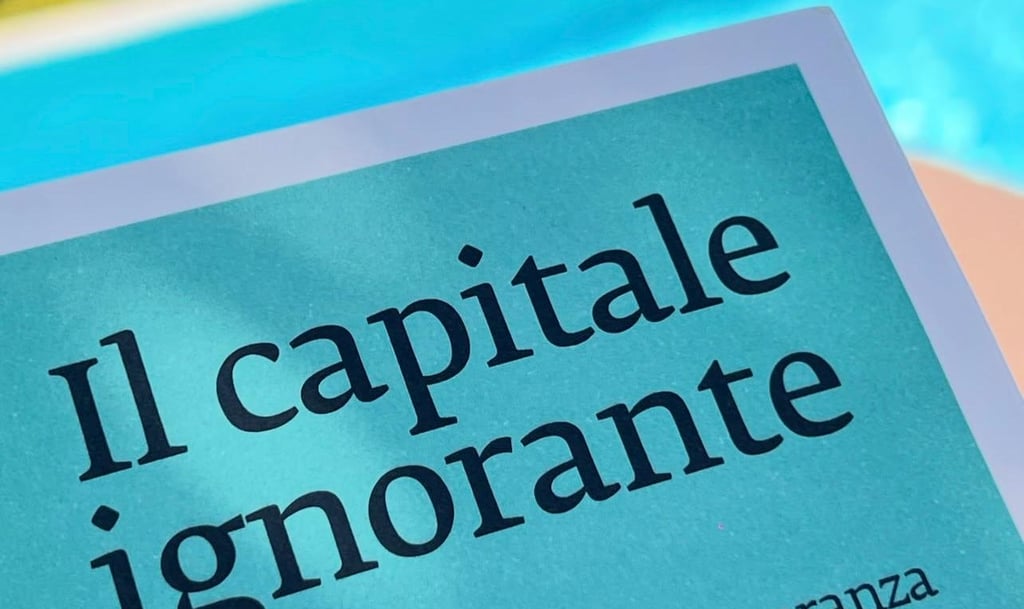The Ignorant Capital: How Ignorance is Changing Art
What happens when ignorance is no longer a lack, but a strategy? The Ignorant Capital by Marco Senaldi offers a sharp and necessary reflection on contemporary art, where ignorance becomes both symbolic and economic capital. In this clear-sighted and uncomfortable essay, Senaldi exposes how simplification has colonized the art system, turning complexity into a taboo. In my curatorial work with Future, this book served as both a mirror and a confirmation: intelligence is not out of style — it’s just harder to sell. A must-read for anyone engaged with the contemporary, to rediscover an art that doesn’t simplify, but opens.
BOOK ON MY TABLE
Charlotte Madeleine CASTELLI
6/13/20252 min read


What happens when ignorance becomes capital?
When it is no longer merely a lack, but a force, a currency, a strategy?
The Ignorant Capital, Marco Senaldi’s sharp and timely essay, poses this question to the art world, offering a disenchanted yet razor-sharp reflection that demands attention.
In my curatorial work with Future, immersed daily in artistic practices navigating technology, critical thought, and emerging aesthetics, this book felt like a revelation: not because it said something entirely new, but because it gave form and density to a feeling that has haunted the halls of art fairs, institutional calls, and mainstream discourse for years: ignorance today has become a dominant language in the art system.
And... it is not simply an absence of knowledge, but a performative void, actively produced and replicated. Senaldi unpacks (with rigor but without academic distance) the mechanisms by which contemporary art — often more concerned with conforming to a globalized lexicon than delving into its own authenticity — succumbs to market logic, forced accessibility, and the illusion of a "democracy of experience" where complexity is treated as a sin. His central thesis is powerful: ignorance is no longer something to be overcome, but something to be capitalized upon.
An immaterial asset that determines who emerges, who is narrated, who gains entry into the circuit. This insight resonates deeply with the work I lead alongside Riccardo Perillo in Maastricht: "Future was born as a response to this very trend, a space of transition and thresholds, where intelligence — the sensitive, human, non-artificial kind — is not silenced but cultivated. There, art is still thought, risk, otherness. A language that doesn't simplify, but opens. And while reading Senaldi, it became evident to me that today, true resistance is no longer just political or aesthetic — it is epistemic." (C.M.C.)
The Ignorant Capital is essential reading for anyone engaged with the contemporary: artists, curators, gallerists, students. It serves as an invitation (or perhaps a provocation) to recognize the cultural consensus shaping us, to ask ourselves what it really means to know something in a time when every piece of content is crafted to be consumed in under thirty seconds. With a direct, elegant yet piercing style, Senaldi succeeds where many texts fail: he holds up a mirror, not to flatter us — but to awaken us, he does so without moralism, but with the urgency of someone who has witnessed the transformation of art into the hostage of its own desire for visibility.
In my own experience, I’ve seen works excluded from the art world’s circuits not because they were “difficult,” but because they were not immediately monetizable. I’ve seen extraordinary projects remain in the shadows because they didn’t translate the invisible into a slogan or pain into a hashtag.
So ... The Ignorant Capital is also a form of legitimization: you are not the one who is outside the system — it is the system that has changed its skin.
This is a book I recommend, that I bring into conversations with artists, and one I return to every time I need to remind myself that intelligence is never out of style. It’s just harder to sell.
— Marco Senaldi, The Ignorant Capital: How Ignorance is Changing Art, Mimesis Edizioni, 2022
© 2025 Charlotte Madeleine Castelli. All rights reserved.
